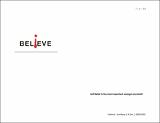| dc.description.abstract | People Believe,
They believe in God, religion, relationships, aliens, ghosts, politicians… We believe in everything and anything, which could help us get through or prevent us from bad luck, bring in money, preserve our health. People who say they do not believe in anything also believe in their theory of non- existence of something else.
India, known as the land of spirituality and philosophy, is home to many religions. Like Hinduism, Islam, Christianity, Buddhism, Jainism, Sikhism and other innumerable religious traditions. In India, religion is life, it is an integral part of the entire Indian tradition. With over 330 million Gods and Goddesses to worship for the majority of Indians, religion permeates in every aspect of life, from commonplace to daily chores to education and politics.
This gives birth to, many beliefs and practises which are followed around us. For example, like wearing gem stones, lockets of Gods and Goddessess, rudraksha , yantras , pooja ki thaliyan, worshiping cows, praying around banyan tree, palmistry, tarot card reading, vastu shastra… and the list goes on. Some of them could be termed as superstition but then, isn’t it said that someone’s belief is someone else’s superstition.
We go great lengths to show our commitment to our beliefs, be it Physical suffering (like walking 14 Kms in harsh terrain of mountains to visit Kedarnath temple), keeping fasts for days or be it donating huge amount of money to Temples and Shrines.
With massive participation of people and day by day more money pouring in, now these religious sectors are becoming more and more commercialized. We can find various books on religion, bhajan CD’s & DVD’s, rings, lockets, yantras, and with science of vastu, payra-vastu and Feng-Shui are also coming up over the years, there has been a tremendous boom in these Belief Markets. This has helped in generating revenue as various services and production of products in these religious sectors is frequent nowadays, which in turn also helps in circulation of money in our economy.
With increase in involvement of money, there is also a chance of people being misled to earn profit from them. People are tipped off on wrong interpretation of scripts and manuscripts. Things that might have held true in yesteryears might not hold true in today’s world but still they are being practiced, and this leads to the point that people follow what is being told instead of understanding the logic, which raises the question: Is the Act for believing more important than the belief itself? | |

